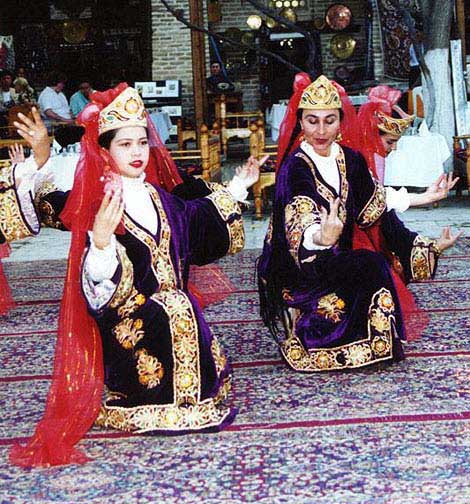
Early one morning in December, 1992, Kenny Butler stepped onto the tarmac of the Tashkent airport with 53 other Americans as part of the first Peace Corps program in Central Asia
Tinchlik Korpusi: Peace Corps in Uzbekistan
by Kenley Butler
Early one morning in December, 1992, I stepped onto the tarmac of the Tashkent airport with 53 other Americans as part of the first Peace Corps program in Central Asia. We boarded a bus and headed through the waking city for the university dormitory on Great Silk Road Street (Buyuk Ipak Yuli) which would be our collective home for three months of training.
For three months we studied the Uzbek language and team-taught English with local teachers at Tashkent schools. Because we lived, ate and studied in the dormitory, our contact with local people was limited. Our American staff was new to Peace Corps and unfamiliar with the languages and traditions of Central Asia. The locals who taught us Uzbek were helpful in passing on some basic cross-culture information, but as whole, the training period did not prepare us for life in Uzbekistan.
In March we were assigned to our sites where we were to spend the next two years. I spent my first three months in Andijon, a city of about 400,000 in the Ferghana Valley. It has no spectacular monuments to speak of and rarely draws any foreign visitors. Andijon has more in common with an Uzbek village than a city, with its sprawling Uzbek neighborhoods (makhalla) and its population rooted in tradition.
It was here that I really learned to speak Uzbek. The people of Andijon pride themselves in the purity of their dialect, which is close to literary Uzbek. Since I had few responsibilities at my school, having arrived in the middle of the semester, I devoted myself to learning the language by engaging myself in conversation with anyone and everyone on the street, in the stores and at the bazaars. I feigned ignorance of Russian which delighted the Uzbeks who had rarely spoken their native tongue with a European.
Because I caught on quickly to he language, I found myself a frequent guest at weddings, circumcisions, all-night conversations (gap) and at official New Year (Navruz) celebrations. I learned to dance to Uzbek music (a requirement of guests) and to give a speech in Uzbek at the drop of a hat.
Being a guest always had its ups and downs. The food was generally very good. But the feeling of being captive to the host was sometimes unnerving. Dinners lasted for hours and might involve meeting all the extended relatives from far and wide. Instead of allowing me to go home, the host would roll out a pad (korpucha) for me to sleep on. Yet the attention and respect accorded guests, though wearisome to both parties, was very sincere. A guest is a gift from God, I was told. I managed to get myself out of some potentially dangerous situations, including robbery at knifepoint, by explaining that I was a guest (mekhmon).
After three months in Andijon, I was reassigned to Samarkand, a city of 500,000, rich with history and dotted with spectacular monuments. The likes of Alexander the Great, Chingiz Khan, Tamerlane and Ulugbek had contributed, in their own ways, to the history of the city.
I was assigned to work at public school #9. I taught English to approximately 100 children in grades 6-11. With a grant from USAID, I built an English resource center in an outlying building. We had three classrooms for English teaching, ESL textbooks and readers for the children, a small English library, maps, magazines and a piano. My classes, based on role-play and music, supplemented the grammar rule-based teaching of the local teachers.
I lived for a while with two Uzbek students studying at Samarkand State University in a house next to my school. On weekends, I would often go home with them to their villages where I would be taken from house to house to be a guest with all their relatives. I particularly enjoyed attending the village wedding ceremonies which could last for days.
Our Peace Corps program was wrought with problems from the very beginning. It was a new program in a part of the world Americans knew little about. Our newly-hired American staff was as unfamiliar with the region and unfamiliar with Peace Corps as we volunteers were. The country’s changing economic situation only exacerbated the inevitable problems 54 Americans in Central Asia might face. Thus our program had a high dropout rate for both volunteers and staff.
I came away from my two years with a deep respect for and interest in things Central Asian. My ambivalent feelings toward Peace Corps and its operations in Uzbekistan are mitigated by the personal friendships I made, and the satisfaction I had in the daily English lessons with children at my school.
Kenley Butler is a graduate student in the School of Public Affairs here at U.W.
